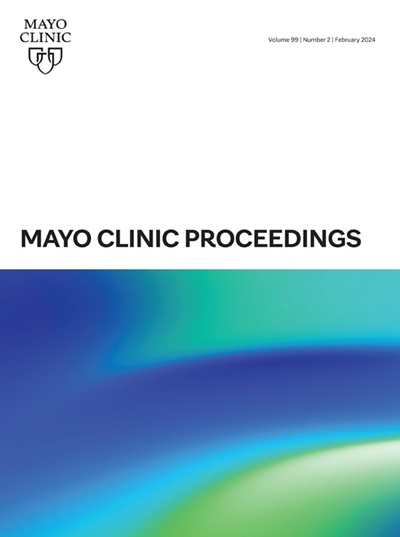Association of Informal Caregiving and Menopause Symptoms in Midlife Women: A Cross-Sectional Study
IF 6.7
2区 医学
Q1 MEDICINE, GENERAL & INTERNAL
引用次数: 0
Abstract
Objective
To assess the association between caregiving and menopause symptom burden in midlife women.
Patients and Methods
A cross-sectional analysis was conducted among women aged 45 to 60 years receiving primary care at 1 of 4 Mayo Clinic geographic locations between March 1 and June 30, 2021, who completed a survey study. Caregiving status was self-reported, and menopause symptoms were assessed using the Menopause Rating Scale. The primary outcome was moderate or worse menopause symptoms.
Results
A total of 4295 women (mean age, 54.6 years) were included, 845 (19.7%) of whom self-identified as caregivers. Among all 4295 women, 1614 (37.6%) reported moderate to very severe menopause symptoms. The proportion of women with moderate or worse menopause symptoms in at least one symptom domain increased as the number of caregiving hours increased: 92 of 270 (34.1%) in the less than 5 hours per week group, 123 of 289 (42.6%) in the 5 to 14 hours per week group, and 144 of 286 (50.4%) in the 15 or more hours per week group (P<.001). In univariate analysis, caregiving for 15 or more hours per week significantly increased the odds of having moderate or worse menopause symptoms in at least one symptom domain compared to no caregiving (odds ratio, 1.77; 95% CI, 1.39 to 2.26; P<.001). The association remained significant in multivariable analysis after adjusting for potential confounders (odds ratio, 1.37; 95% CI, 1.05 to 1.78; P=.02).
Conclusion
This study identified a positive association between caregiving hours and menopause symptom burden. Given the aging US population and likely resultant increases in caregiving burden, there is a critical need to address menopause symptoms and to provide support for midlife women in caregiving roles.
非正式照顾与中年妇女更年期症状的关联:一项横断面研究。
目的:探讨护理与中年妇女更年期症状负担的关系。患者和方法:对2021年3月1日至6月30日期间在梅奥诊所4个地理位置之一接受初级保健的45至60岁女性进行了横断面分析,这些女性完成了一项调查研究。自我报告照顾状况,并使用更年期评定量表评估更年期症状。主要结局是中度或更严重的更年期症状。结果:共纳入4295名女性(平均年龄54.6岁),其中845名(19.7%)自认为是照顾者。在所有4295名妇女中,1614名(37.6%)报告了中度至非常严重的更年期症状。随着护理时间的增加,至少有一种症状领域出现中度或更严重更年期症状的妇女比例增加:每周少于5小时组270人中有92人(34.1%),每周5至14小时组289人中有123人(42.6%),每周15小时及以上组286人中有144人(50.4%)。(结论:本研究发现护理时间与更年期症状负担呈正相关。鉴于美国人口老龄化和可能导致的照顾负担的增加,迫切需要解决更年期症状,并为照顾角色的中年妇女提供支持。
本文章由计算机程序翻译,如有差异,请以英文原文为准。
求助全文
约1分钟内获得全文
求助全文
来源期刊

Mayo Clinic proceedings
医学-医学:内科
CiteScore
16.80
自引率
1.10%
发文量
383
审稿时长
37 days
期刊介绍:
Mayo Clinic Proceedings is a premier peer-reviewed clinical journal in general medicine. Sponsored by Mayo Clinic, it is one of the most widely read and highly cited scientific publications for physicians. Since 1926, Mayo Clinic Proceedings has continuously published articles that focus on clinical medicine and support the professional and educational needs of its readers. The journal welcomes submissions from authors worldwide and includes Nobel-prize-winning research in its content. With an Impact Factor of 8.9, Mayo Clinic Proceedings is ranked #20 out of 167 journals in the Medicine, General and Internal category, placing it in the top 12% of these journals. It invites manuscripts on clinical and laboratory medicine, health care policy and economics, medical education and ethics, and related topics.
 求助内容:
求助内容: 应助结果提醒方式:
应助结果提醒方式:


